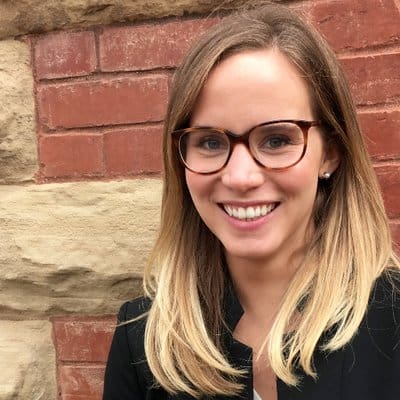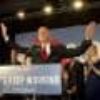Introduction
Editor’s note: The Center for Public Integrity is tracking political advertising in races for the U.S. Senate and state-level offices. Use these two, interactive features — with new data every Thursday — to see who is calling the shots and where the money is being spent.
Of the millions of dollars worth of ads aired in Kansas’ competitive gubernatorial race, most have not been paid for by the campaigns of Gov. Sam Brownback, a Republican, or his Democratic opponent, Paul Davis.
Instead, two vaguely named entities have dominated television airwaves there, spending more than $3 million to saturate commercial breaks from Topeka to Wichita with roughly 7,000 ads that boosted or bashed the incumbent governor.
Who funds these groups remains largely a mystery. The groups, nonprofits exempt from paying taxes, are not required to disclose their donors in Kansas and most other states.
One group called the Alliance for Freedom, a Virginia-based conservative nonprofit, sponsored ads touting Brownback’s accomplishments as governor. Kansas Values Institute, a group run by two former Republican state legislators but backed in part by a teacher’s union, began airing ads attacking Brownback’s record on education and economic policy soon after the August primary election. Neither group responded to requests for comment.
Four years ago, the last time Brownback ran, no such groups purchased ads in the governor’s race in Kansas, and only $713,000 was spent on TV ads overall. This cycle, non-disclosing groups paid $3.3 million of the $6.3 million spent on ads run in the state so far. And Kansans have seen more ads for state-level elections produced by these secretive groups than voters in any other state.
Since 2010, a year when the U.S. Supreme Court’s Citizens United vs. Federal Election Commission decision loosened restrictions on third-party political spending, such secretive groups have gained traction in state politics even beyond Kansas.
With less than a month to go until Election Day, more than two dozen of these political nonprofit groups have aired at least $9.3 million worth of ads to influence state elections in 16 states across the country this cycle. It’s a small slice of the $430 million spent on TV advertising overall for state-level offices, according to a Center for Public Integrity analysis of preliminary data through Oct. 6 from media tracking service Kantar Media/CMAG. But it has already surpassed the $8.4 million spent by such groups during the entire 2010 election cycle, when a comparable number of governors’ seats were up for election.
Related: Big money is being spent in U.S. Senate elections, and Democrats have an edge in the ad wars.
Yet given the buffet of options donors can access to influence an election —including contributions to candidates, parties or political action committees — why have these secretive groups that are supposed to promote “social welfare,” not politics, become more active in the states?
“It’s because they can,” said Kenneth Mayer, a professor at University of Wisconsin-Madison who studies campaign finance.
Groups such as Kansas Values Institute may attract donors who seek the anonymity provided by many of these nonprofits.
“People believe that there is an important constitutional right to engage in anonymous spending,” Mayer said, referencing the view articulated by Supreme Court Justice Clarence Thomas in the 2010 Citizens United case. “If you don’t have to disclose, there might be some reasons why you would find it in your interests.”
However the ability of these nonprofit organizations to engage in political spending predates Citizens United by about 30 years, according to Marcus Owens, an attorney and former director of the IRS’s Tax Exempt Organizations Divisions.
Since 1981, groups such as the National Rifle Association, AARP and Planned Parenthood — sometimes referred to as “501(c)(4)’s” in shorthand for the section of Internal Revenue Code under which they are regulated — have been legally permitted to purchase “issue ads,” which may name candidates but not urge viewers to “vote for” or vote against” a specific politician. Groups could engage in this narrow kind of election activity, without disclosing the source of their funds, so long as such politicking was not the group’s “primary purpose.”
Citizens United, combined with another 2010 ruling from a lower federal court, freed corporations and unions to spend limitlessly to directly advocate for the victory or defeat of candidates. For the nonprofit groups, which are technically corporations, the court rulings provided both new legal freedom and a symbolic boost.
“The rules were already there,” Owens said. Citizens United signaled to these groups that, “the sort of psychological impact of federal election law was lessened and the way was clear for more corporate-oriented money to flow in.”
Attempts by the IRS to regulate this new kind of political spending — and allegations that the agency was disproportionately targeting conservative groups with its audits — resulted in the resignation of a high-ranking IRS official a year ago. Hobbled from the brouhaha, the IRS has been limited in its supervision of these groups, as the Center for Public Integrity has previously reported.
This election cycle, more than 65 percent of the ads by such groups have been negative attacks on candidates for the top-of-the-ticket gubernatorial races.
Leaving the negative message to outside players, especially those groups that can shield the identity of their donors, allows candidates to insulate themselves from the public backlash that can come with a negative campaign, according to Kyle Kondik, a political analyst at the University of Virginia’s Center for Politics.
“It’s preferred to have the outside group doing the really brutal stuff,” Kondik said. “Because the candidate can really disavow it or they don’t have to claim responsibility for it.
Some entities active during 2010 have reappeared in 2014. For example, American Future Fund, a conservative group based in Iowa, aired ads in attorneys general races in Ohio, Iowa and Kansas in 2010 and returned to spend more than $360,000 to boost Republican candidates in the Nebraska gubernatorial and Arkansas attorney general contests this cycle. The Law Enforcement Alliance of America, another Virginia-based nonprofit was active in Michigan’s state supreme court and attorney general races in 2010. This time, it spent nearly $165,000 to attack one candidate for the Arkansas Supreme Court.
Less is known about newer entities. Arizona Save Our Future Now, a Phoenix-based nonprofit that formed in 2012, aired more than $1 million in television ads attacking Vernon Parker, a Republican candidate for Arizona’s corporation commission this election. The five-member board sets utility rates.
Including spending by Arizona Save Our Future Now, Arizona has seen roughly $2.6 million in secretive spending in its state-level elections this year, the most in the country apart from Kansas, according to the Center for Public Integrity’s analysis.
Arizona Save Our Future Now and four other nonprofit groups active in Arizona triggered an audit from the secretary of state’s office in July compelling the organizations to prove they spend more funds on “social welfare” than on influencing elections, or else register as political committees and disclose their donor lists.
None of those five groups disclosed its donors to Arizona election regulators, but the groups did reply to audits with evidence of nonpartisan get-out-the-vote activity that they argued adequately offset their political advertisements.
In some states, these politically active groups have had to disclose their donors. In North Carolina and Georgia, for example, some of these groups airing political ads have revealed their funders despite their federal tax status.
But in other states, such entities that apply for income tax exemptions don’t need to file an annual report to the IRS disclosing their officers and financial information until more than a year after they form and long after Election Day, further obscuring who controls the message voters see on television ads, according to Owens.
Sometimes the groups can set up shop, air ads during an election then dissolve as soon as the polls close, without registering with the IRS or state agencies. With a two-year lag before a group reaches the top of the IRS audit pile and a three-year statute of limitations, Owens said he suspects many politically-active nonprofits are playing “audit roulette,” hoping to run down the clock before disclosure requirements kick in.
“There seems to be a sense generally that secret money flowing into state elections is potentially corrupting, potentially in violation of particular state laws,” he said. “You certainly don’t know who’s funding political campaigns, and it might be useful information for voters to know.”



Join the conversation
Show Comments